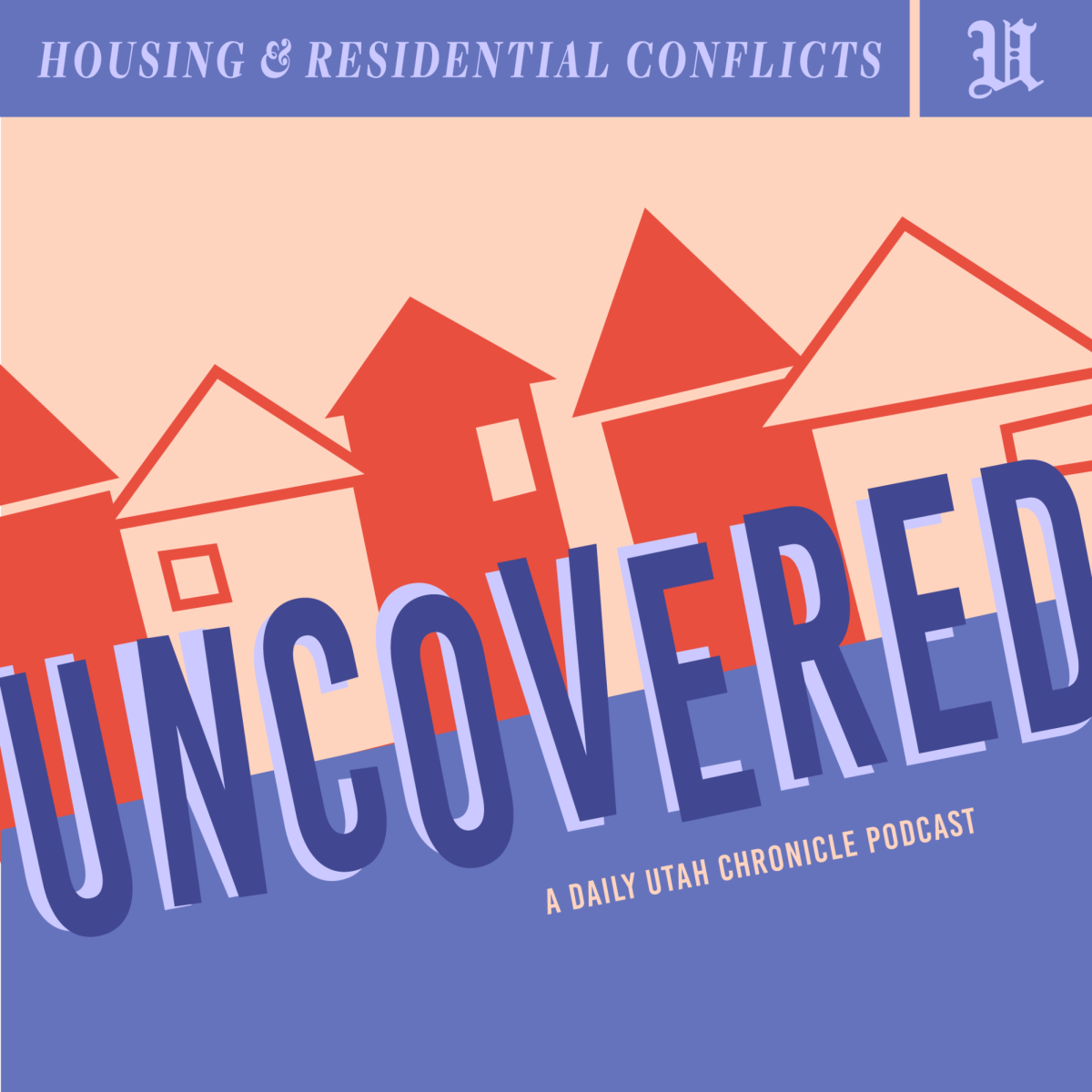Today, Investigative Writer Aynaelyssya Thomas joins Emma to discuss her two recent articles on internal conflicts at Housing and Residential Education at the University of Utah. You can read her articles here and here.
Transcript
Emma Ratkovic: Hello, and welcome back to Uncovered, the Daily Utah Chronicle’s investigative podcast. I’m your host, Emma Ratkovic, and on this episode of the podcast, Aynaelyssya Thomas is joining me to discuss her recent story on the internal conflicts of Housing and Residential Education. Hi, Aynaelyssya, thanks so much for joining me on the podcast today.
Aynaelyssya Thomas: Hi, thank you for having me.
Emma Ratkovic: Aynaelyssya can you introduce yourself and describe your role here at the Chrony?
Aynaelyssya Thomas: Hi, so yeah, I’m Aynaelyssya, and I am an investigative writer here for the Chrony.
Emma Ratkovic: Awesome. And so you recently wrote a story about some of the conflicts that housing and residential education are facing. You share that in order to perform their jobs, six RAs, both current and former, and one CA claim that HRE leadership did not provide them with the necessary training or assistance and that they were held to unreasonably high standards. Can you explain more in depth the response to these employees in relation to Housing and Residential Education?
Aynaelyssya Thomas: Yeah, of course, so many RAs when they spoke to me, felt like they were held to unreasonably high standards by their either RDs or RCCs or CAs. They just said that honestly, the trainings didn’t really provide them with a lot of information that they needed for their roles, or that they were just told to do a lot of things that they didn’t feel like they had the proper tools for. And if they didn’t do them, they felt like it was a bad situation for them to be put in. But also that their RDs wouldn’t respect that they weren’t able to do that, and that they’d ultimately have to end up doing it anyways.
Emma Ratkovic: That’s very interesting. So, can you explain once again, the role of an RA and a CA and what made the roles different from the training they received?
Aynaelyssya Thomas: Yeah, so an RA lives in the residence hall with the residents. They are the primary point of contact for them, and they’re just there to support students. They do things like “U Talks” and just checking in on their students’ mental health, and they’re just their go-to person throughout the day if residents need anything. For CAs they do nightly rounds. So they’re the ones walking around at night, checking in on things doing, like noise checks, but then also any alcohol or drug busts that go on. They will be the ones that probably write students up throughout the night. The CA position is actually new this year. And so what made the roles different from the training they received was that CAs kind of did have to be trained more for emergency procedures, especially throughout the night. But primarily they do get a lot of the same training, which was an issue that CAs expressed to me.
Emma Ratkovic: And you explained that multiple RAs were unable to provide support that students needed due to limitations set on them by HRE. What were these limitations, and how did this impact the support that they provide to students?
Aynaelyssya Thomas: Yeah, so, during their trainings, they’re trained for an extensive period of time on numerous different matters. And so, honestly, the RAs felt like their training didn’t actually help them solve a lot of problems, they were trained on certain things more than they were trained on others, or that during their own time as an RA, they would have to teach themselves multiple things, or they would just have to refer back to manuals rather than actually being taught that in their own training. The limitations that were set on them were — honestly, that there are certain roles that they’re able to fill. But there’s also certain things that they’re not able to do as they are students of the university. Many expressed the oftentimes they were referred to as employees, but other times they were referred to as volunteers or students, and that has caused numerous issues with RAs because they don’t actually properly know how to handle some situations dependent on what they’re referred to as by HRE.
Emma Ratkovic: Very interesting. So one former RA compared their lack of training to a nurse not having a degree working in a hospital. They also shared that they were held to a high standard and didn’t have the resources to meet those expectations. These RAs may also be met with legal consequences that they felt they didn’t have the proper training and care to endure. What legal consequences could RAs and CAs be met with?
Aynaelyssya Thomas: Yeah, so as an RA and a CA, you’re put in many situations that, as a regular student you wouldn’t necessarily know how — you wouldn’t have to know how to respond to. But because of those leadership positions, they obviously have to respond to a lot of different things such as mental health crises. And many times, they have to wait for area duty to be able to help them, and so they’re not able to respond in certain ways that maybe somebody else would be able to because they do have to rely on the fact that Housing and Residential Education is there to help them, but also that they are in a unique position because they are an employee of HRE. And so the legal consequences are primarily that HRE could be sued for some things, if anything was to happen to a student. As for that, they’re not entirely sure what some of these legal consequences are, it’s just more of a legality thing that gets brought up in meetings — RAs go through meetings where they’re told that legal action could be taken if something happens.
Emma Ratkovic: And you mentioned that even while the training schedules are full, the August 2023 schedule reveals that despite the 94 pages in the Emergency Procedure Manual, the student leaders only spent an hour and 15 minutes of the weeklong training going over emergency procedures. How did this impact the RA and CA’s ability to respond to any given emergencies?
Aynaelyssya Thomas: Yeah, so interestingly enough, when an RA or CA responds to an emergency, they have to call their RD which is also area duty. Area duty is primarily whatever RDs are working that day. And area duty has to be the one to respond to it. I’ve actually heard multiple times that, sometimes area duty is sitting there going through the Emergency Procedure Manual to actually figure out how to respond to certain situations. They don’t spend as much time as they should, according to RAs, because it is 94 pages long. And so they have to go through it completely. But a lot of times, these RAs and CAs have to teach themselves the Emergency Procedure Manual. That way, they’re able to respond to an emergency. So they don’t always necessarily know how to sometimes.
Emma Ratkovic: And why are CAs are given the same training as RAs are, given is that they fulfill different roles?
Aynaelyssya Thomas: This is a big question that’s coming from CAs. Because it is new position. And so they haven’t worked out all the kinks yet. And it just has seemed to be that RAs are the primary set of training. Therefore, CAs are going to be trained on everything that RAs are, but also get their own partial unique training to their position. That way, they do know how to do their position. Many CAs have expressed frustrations with this because they aren’t an RA, but they’re learning how to do both positions.
Emma Ratkovic: And can you explain some of the mental health issues caused by these working conditions that students experienced?
Aynaelyssya Thomas: Yeah, so, many RAs that I spoke to have faced mental health crises after going through some of the things that they have. They’re not necessarily allowed to talk about some of the conditions that they’ve been put in. But also, they’ve expressed that they just feel like the job has taken a really heavy toll on them, and that, overall, some do not feel like it has been worth it, whether or not they get free housing. But that it’s not only balancing being a student, but you’re also balancing other students’ lives. And there’s a lot of expectations that they feel have been put on them. And so many struggle from their day-to-day with this position, especially after experiencing a crisis from another student, from a resident. And they don’t feel like that proper support is there for them when they are experiencing their own mental health issue.
Emma Ratkovic: You shared that many student RAs and CAs felt too much pressure to perform perfectly in their roles. How did these students address these issues with HRE staff?
Aynaelyssya Thomas: Yeah, so student leaders in HRE have expressed that they they do feel like they have to perform perfectly in their roles, especially under certain resident directors, and that’s just dependent on the area that they live in. But also, just their own personal being and what the resident director knows they’re capable of, but also what they expect them to be capable of. Many have said that they’ve tried to talk to their RDs about it, but it hasn’t necessarily come back being positive — more, it’s like, “You’re slacking on your job.” And so, they tried to deal with it themselves, or they just do what is expected of them or they just expect the consequence when it doesn’t happen. And they’re not able to complete everything. And so they do their best and many, like, expressed their frustrations to me, but they don’t necessarily feel comfortable doing so to their RD.
Emma Ratkovic: Can you elaborate on the yearly statistics of the turnover rate of RAs and CAs?
Aynaelyssya Thomas: Yes. So from my understanding based on the people that I’ve spoken to, many RAs did not return after last year. That is entirely dependent on whatever situation they were in, who they worked under, where they worked or just simply the fact that they just didn’t want to come back. For CAs they are new, but many RAs that were not recommended to be rehired — this was expressed to me from a CA — were actually hired as CAs rather than RAs. And the turnover rate for that is to be expected, however this year continues.
Emma Ratkovic: Alright. And you explain that a minimum of 12 undergraduate credits and a maximum of 18 credits, a cumulative and semester GPA of 2.5 and 3.5 for honors communities, maintaining good conduct [and] financial standing with the university [and] in completion of all necessary training are the prerequisites for becoming a student leader. What is meant by financial standing/good conduct? With each student’s financial situation being unique, how are students supposed to maintain good financial standing?
Aynaelyssya Thomas: For good conduct, they’re just supposed to, obviously, maintain good behavior within the university, they can’t be getting written up, they can’t get in trouble with the university. And so, for financial standing, from my understanding based on the interviews, but also just all of the information provided by HRE, it is entirely dependent on the student and the student’s situation. That was honestly kind of unclear, and it’s not exactly written down or given a distinct definition anywhere.
Emma Ratkovic: Alright. What reaction do students have to the rating system used to assess the RAs work?
Aynaelyssya Thomas: Yeah, so many students don’t feel that the rating system is a proper system to, obviously, score them and evaluate them because it rates by number, a certain number of things. But also it doesn’t necessarily properly evaluate what it means to be a good leader. They’re more worried at that point about getting good scores, that way they can be rehired, than they are about actually doing what it means to be a good leader. And unfortunately, many have expressed that that is their feeling. And that’s just been the case for some RAs.
Emma Ratkovic: How are RAs expected to handle mental health crises?
Aynaelyssya Thomas: Yeah, so many RAs experienced their own mental health crisis after experiencing a student’s mental health crisis or resident’s mental health crisis. They are supposed to handle them by calling the area duty. And honestly, they are just expected to be some sort of support and refer them to the proper resources. The RAs do have a list of resources provided by HRE and the university that they refer students to, but primarily, from my understanding, area duty is the one that is supposed to handle part of it. They’re also supposed to do “U Talks” with their own residents, which is just a mental health check-in. And it’s many questions that prompt conversation about how they’re doing. There’s a certain number of”U Talks” that are required per semester, and then you are also scored on the “U Talks” and if you did them or not.
Emma Ratkovic: What is the role of a RD, and how does their role differ from an RA? And what is the expected work relationship between them and RAs?
Aynaelyssya Thomas: So an RD is a resident director and they are the supervisors over RAs, from what I have been told and what has been communicated to me is that RDs are graduate students and they tend to have more experience in Housing and Residential Education. What’s expected from them is, obviously, they are supposed to supervise RAs, and they’re supposed to be that primary point of contact for them. Their residents are supported by RAs and RAs are supposed to be supported by RDs. What is expected between their working relationship is supposed to be professional, but also RDs are supposed to care and supposed to be there for their RAs and be that primary point of contact, that person that they come to if anything is going on, or just that person that they can express their problems to. And then from there being referred to the right resources.
Emma Ratkovic: And can you explain more in depth on the disciplinary process used by RDs?
Aynaelyssya Thomas: So RDs are the ones that students — or I guess RAs — meet with, if anything happens, or if anything comes up, as far as disciplinary measure goes, RDs do have the ability to write their RAs up, and to enforce some sort of disciplinary measure. This is entirely dependent on the RD, from what has been told to me. And many RDs use that position differently. And so it just is, once again entirely dependent on the RD. The disciplinary process is set by Housing, that there’s not a certain number of write-ups that a student will receive until that leads to termination, but also, the RDs do have people above them that they’re supposed to report to about certain matters.
Emma Ratkovic: And if students are terminated from their housing, are they given accommodations to find other housing options?
Aynaelyssya Thomas: I have been told both — I’ve been told by some people that they were not given proper housing accommodations, but I’ve also been told by others that they were, that they weren’t just kicked out during the middle of the year. But also from some others, they have expressed that you know, they were terminated, or somebody they know was terminated and given a certain number of days to move out. And then they had to find somewhere else to live. Usually HRE, because it is under the university, can’t technically leave a student without somewhere to live after firing them.
Emma Ratkovic: Okay. Very interesting. And in your opinion, how can HRE staff better support student RAs and CAs?
Aynaelyssya Thomas: In my opinion, I think that HRE can do a better job of honestly supervising their own RDs. From everything that I’ve learned, RDs have been a major problem for RAs and CAs, because they just do not feel that there’s support. There’s been many RAs and CAs that have said that they’ve left meetings crying with their RD, that they have left meetings where — they just were incredibly uncomfortable. And they just felt like they didn’t even want to be in the position anymore, because their RD made them feel so bad. So I think that HRE can just do a better job at honestly knowing what RAs and CAs are going through and how to properly respond to that without immediately jumping to disciplinary action.
Emma Ratkovic: And, do you have any final thoughts or comments?
Aynaelyssya Thomas: I’m just so thankful for everybody that has helped with these stories. They’ve been a lot of work. And everybody has been so amazing in the process of getting them together. And I’m so thankful for all of the RAs that finally felt like they could come forward and actually share what they’re thinking and feeling with me.
Emma Ratkovic: Awesome. Well, thank you so much for joining me on the podcast today, Aynaelyssya.
Aynaelyssya Thomas: Thank you so much for having me.
Emma Ratkovic: And I’m your host, Emma Ratkovic. And thank you so much for tuning into this episode of Uncovered. Make sure to stay tuned for upcoming episodes.
Producer and Host: Emma Ratkovic // [email protected] // @eratkovic_news
Guest: Aynaelyssya Thomas // [email protected] // @AynaelyssyaT













